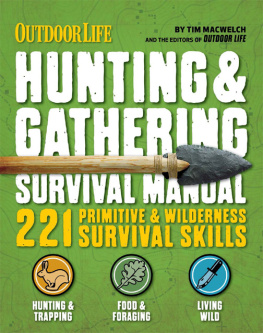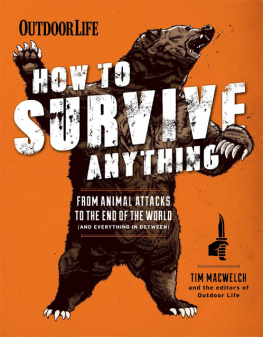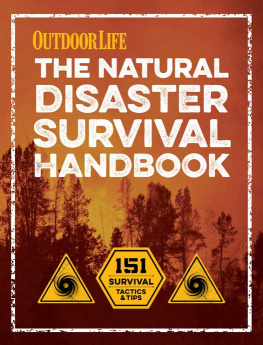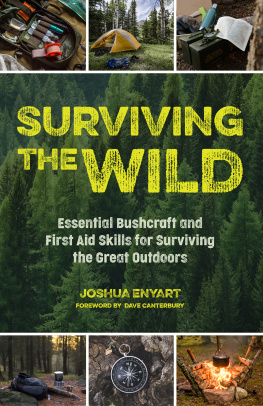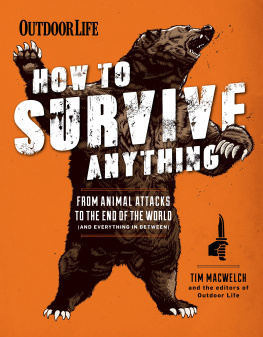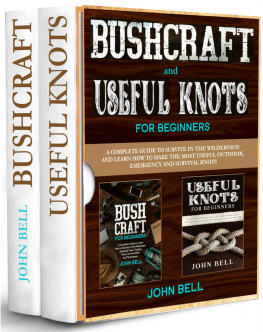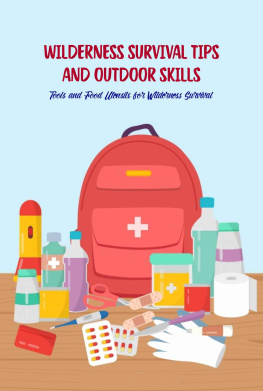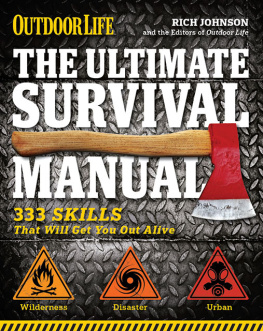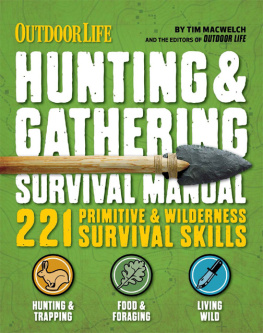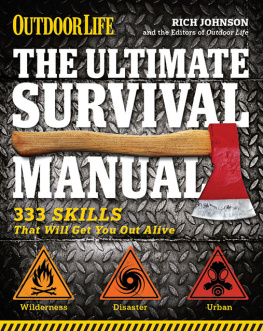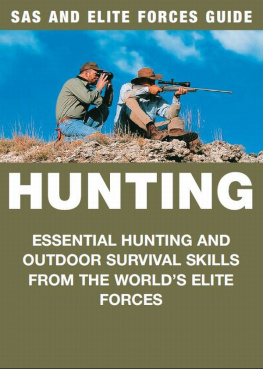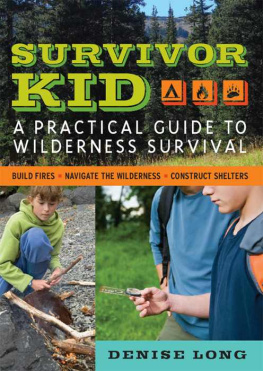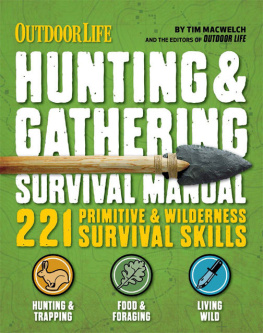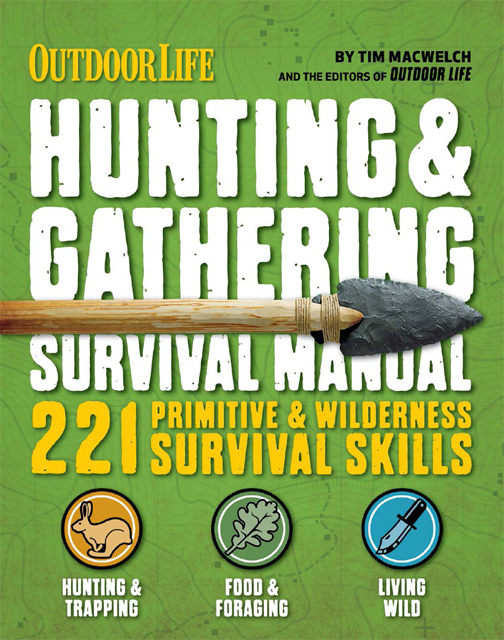
FROM OUTDOOR LIFE
L ETS BE HONEST. You probably dont need this book. You can fill your refrigerator and pantry daily from the storehouse of packaged provisions at your local supermarket. You can eat sanitized meat and prewashed vegetables. Everybody does it. Im sure youll be fine.
But equally clear is this: If you are reading this, then you know everything is not always fine. You know the supermarket is a flimsy convenience, its freezers and fluorescent lights less reliable than most people think. You know you may not always be able to count on a take-out pizza from the joint on the corner.
If you are reading this, then you are obeying some primitive urge to take care of yourself. I dont mean tuning your head by seeing a counselor or toning your body by visiting a gym. Im talking about the most basic kind of maintenance: Surviving until at least tomorrow by finding shelter for yourself and your tribe, protecting your possessions, and most fundamentally, gathering and keeping food.
Its easy to ignore these Paleolithic impulses in our digital, ironic age, but if you look deeply, youll see evidence of our ancient caloric urges: your neighbors kempt garden, your taste for heirloom vegetables and undercooked meat, the deep satisfaction you feel when you pluck ripe fruit from a wild tree, your tendency to hoard bacon when it goes on sale.
This book is not only a users guide to accumulating calories in any way possible, its also a rich celebration of your inner scavenger.
The author of this book, Tim MacWelch, is what Id call a cheerful skeptic. Hes not so sure well always have enough rain to grow our gardens or that our neighbors will always be charitable when they run out of food. Hes uncertain of our anonymous systems of energy and food distribution. Hed rather rely on his own wits and wisdom to make his living.
Tim is no pointy-headed prepper or deep-woods mystic. He isnt a doomsayer or a conspiracy theorist. Instead, hes pragmatic, practical, and one of the few people Id like to be stranded with in the wilderness, which can be defined as the remote backcountry or the empty streets of suburban subdivisions. Tim solves problems by calmly, reasonably assessing situations and observing alternatives, and then finding food nearly everywhere he looks. This book is really a series of alternatives to the supermarket.
But its more than that. Its a manual to living honestly.
Tim teaches you how to catch a fish, but more critically, how to preserve a limit of fish so you can eat them for the next month. Tim teaches you how to recognize edible plants, but also how to save their seeds so you can perpetuate their sustenance. Tim teaches you how to light a fire, cook and cure wild meat, make a food-saving brine, recognize poisonous plants, concoct an herbal remedy, find water, rig a bow, set a snare, and if you get weary of all that solitude, signal for help.
This is a field guide to our collective past as much as it is a users guide to the future. But ultimately, its a modern manual for noticing that the world around us is full of food. So buy this book. Take it home and learn how you can gather a wild salad on your way home from work. How you can catch a weeks worth of fish by setting out a simple trap in your neighborhood creek. How you can recognize the obscure wildlife in your area by reading their tracks and their scat. How you can make a serviceable bow out of household products.
And, ultimately, how you can recognize calories in all their various and obscure forms in the world around you. Because its caloriesnot relationships, or money, or possessionsthat will enable you to survive from today til tomorrow. And pass this book down to your heirs.
Andrew McKean
Editor-in-Chief, Outdoor Life

Can you really live off the land like our ancestors did?
The truthful answer isnt a simple yes or noit depends on a dizzying array of factors. The location, the time of year, the weather, and the populations of plants and animals all have a huge impact on the success of a modern-day hunter-gatherer. And how long are you planning to live on wild food? It may be easy to find food for a day, but finding food for a year is a much more daunting task. Cultivating and honing your foraging, fishing, trapping, and hunting skills will play a major role in the amount of food you can bring homeor back to base camp. And in all your pursuits, youll need to be observant, patient, intuitive, and lucky in order to maintain a full, balanced diet of wild foods.
But it can be done.
You and I are living proof that our forebears collected their meals from the wild. Food harvesting, in fact, is the worlds oldest occupation. Once our predecessors secured their shelter, fire, water, and tools, the rest of their daily labor would have been devoted to the gathering of foodas is this book. The Hunting & Gathering Survival Manual is designed to be your guide through the world of foraging wild edible foods, harvesting game animals, and providing for your every survival food need.
The art of collecting food from the wild is a synergistic one; all the disciplines are connected. Once you know the basics, your scouting trip for new trapping sites can quickly turn into a wild fruitforaging mission, just as your quest to harvest cattail plants can easily turn into a profitable fishing trip. These are self-preservation skills that will take you back into the outdoorsyour natural habitat. With practice, your eyes will be opened to the amazing variety of foods that fill the parks, countrysides, and wild places all around you. And with luck, youll never need to go hungry again.
Now, lets eat!
-Tim MacWelch
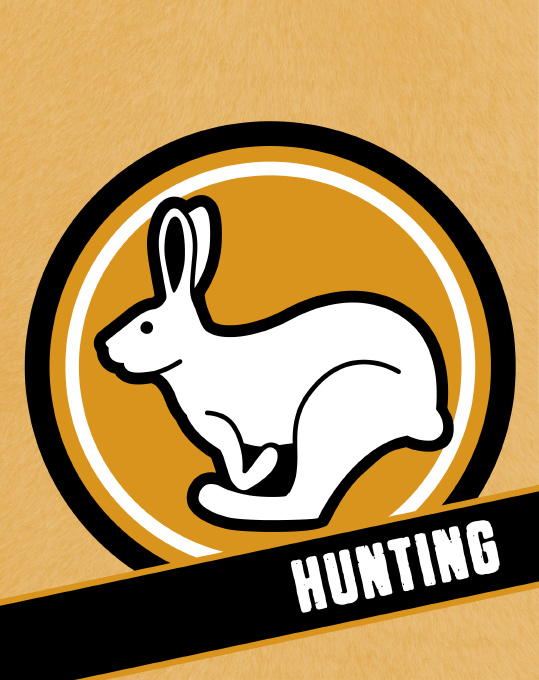
I n my years of teaching survival classes, Ive often been asked about the strangest thing Ive ever eaten. The answers always come from the animal kingdom, and the list invariably contains a lot of random animals and animal parts. Ive eaten deer hearts, squirrel tongues, opossum lungs, and countless other meats and organs, most of which were surprisingly tasty.
These organs and offal werent on my plate for some trivial reason; no one dared me to eat anything, nor was I trying to look like some kind of macho survival guy to my friends or students. When I eat most animals, I almost always eat more of them than most folks do, because the organs and other parts are nutritious, and because its the right thing to do. Taking an animals life should be a sobering experienceit should mean something. By using the entire animal, I honor the experiences of hunting, trapping, and fishingand I prepare for a survival scenario in which every calorie counts. This first chapter will teach you the practices of respectful harvesting from naturenot just how to be a predator.
And to that end of conservative collection, Ill show you how to get started in fishingwhether you have tackle or not. Youll build a foundation in animal-trapping skills and learn what to do once youve landed your quarry. From cleaning and preserving to gaining the most nutrition and biggest calorie payouts, youll get a lot of mileage from this arena of the wild-food realm.

